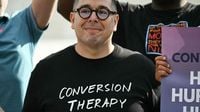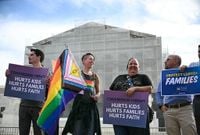The U.S. Supreme Court returned to the national spotlight this week as it heard oral arguments in a case that could reshape the legal landscape for LGBTQ rights across the country. At the center of the debate is Colorado’s ban on conversion therapy—a practice widely condemned by medical experts for its harmful effects on LGBTQ youth. But as the justices questioned lawyers on October 7, 2025, it became clear that the Court’s conservative majority is skeptical of the state’s authority to restrict what it views as protected speech, raising the prospect that nearly half the country’s similar bans could soon be struck down.
The case, Chiles v. Salazar, pits Kaley Chiles, a licensed Christian counselor, against the state of Colorado. Chiles, represented by the Alliance Defending Freedom, argues that Colorado’s law violates her First Amendment rights by preventing her from engaging in talk therapy with minors aimed at changing their sexual orientation or gender identity. According to reporting from USA Today, Chiles contends that her counseling practice is rooted in her religious beliefs and that her speech—no matter how controversial—deserves robust constitutional protection.
The stakes are high. More than 20 states, including New York, have enacted bans on conversion therapy for minors, citing the overwhelming consensus among medical professionals that the practice is not only ineffective but also dangerous. The American Psychological Association and other leading groups submitted briefs to the Court, emphasizing that efforts to alter a patient’s sexual orientation or gender identity fail to meet legitimate therapeutic standards and can lead to depression, anxiety, and increased suicide risk. As Colorado’s solicitor general Shannon Stevenson put it during arguments, “counseling is an evidence-based practice that Petitioner trained for thousands of hours to be qualified to do. And her advice and counseling therapies through her words can be extremely harmful.”
Yet, as The Advocate reported, the Court’s conservative justices appeared deeply skeptical of the state’s rationale. Justice Samuel Alito questioned whether medical consensus can be politicized or ideological, asking, “But have there been times when the medical consensus has been politicized, has been taken over by ideology?” Justice Amy Coney Barrett repeatedly referred to “competing” views, despite the strong agreement in the medical field about the harms of conversion therapy. The skepticism echoed the Court’s June 2025 decision in United States v. Skrmetti, where the justices upheld Tennessee’s ban on gender-affirming care for transgender minors by deferring to legislative judgment over medical expertise. In that case, Chief Justice John Roberts wrote, “Our role is not ‘to judge the wisdom, fairness, or logic’ of the law before us, but only to ensure that it does not violate the equal protection guarantee of the Fourteenth Amendment.”
During the 90-minute session, the justices zeroed in on the distinction between speech and conduct. Kaley Chiles’ lawyer, James Campbell, argued that talk therapy is “pure speech” and thus deserves full First Amendment protection, regardless of whether it is labeled as medical treatment. When Justice Ketanji Brown Jackson pressed Campbell about the classification of the therapy, he responded, “I don’t think it matters because the First Amendment depends on the difference between speech and conduct, not on the difference between treatment and non-treatment.”
Colorado’s defense, meanwhile, leaned heavily on the state’s responsibility to protect minors from harm. Stevenson cited studies showing that conversion therapy has been practiced for over a century with no record of success, and that the harm comes from telling someone “there’s something innate about yourself you can change, and then you spend all kinds of time and effort trying to do that, and you fail.” She insisted that “there is no difference between that and the medical context.” But the majority of the Court seemed unconvinced, focusing instead on the potential chilling effect on professional speech if the law were upheld.
The Trump administration has thrown its weight behind the challenge to Colorado’s law, continuing a pattern of anti-trans initiatives that include bans on transgender military service and efforts to restrict gender-affirming care for youth. As USA Today noted, the administration’s principal deputy solicitor general, Hashim Mooppan, described Colorado’s law as a “sweeping categorical prior restraint”—a heavily disfavored form of speech restriction in constitutional law.
This case is not unfolding in a vacuum. The Supreme Court is also considering other high-profile cases related to LGBTQ rights, including challenges to state laws barring transgender student-athletes from competing according to their gender identity. In West Virginia v. BPJ, the Court will decide whether a law requiring schools to separate students by “biological sex” violates Title IX or the Equal Protection Clause. Similarly, Little v. Hecox challenges Idaho’s “Fairness in Women’s Sports Act,” though that case may be dismissed after Lindsay Hecox, the trans athlete at its center, sought to withdraw her challenge.
Meanwhile, another controversial petition has landed before the justices. Kim Davis, the former Kentucky county clerk who was jailed for six days for refusing to issue marriage licenses to queer couples, has asked the Supreme Court to consider whether the First Amendment protects individuals from emotional distress damages and whether the landmark marriage equality ruling, Obergefell v. Hodges, should be overturned. Davis faces nearly $400,000 in fines related to her refusal to issue licenses. In an August 2025 opinion piece for USA Today, attorney Mary Bonauto and Marc Solomon called Davis’s petition “especially weak” and said it would be “highly unusual for the Supreme Court to grant review.”
Back in the courtroom, the personal stakes of the conversion therapy debate were heartbreakingly clear. Linda Robertson, whose son died after being subjected to conversion therapy, told The Advocate, “We were told by pastors and Focus on the Family that we had to fix him. Instead, we taught him to hate himself. And when a child is dead, you don’t ever get to repair that.” Her words served as a poignant reminder of the real-world consequences at the heart of the legal wrangling.
As the justices deliberate, legal experts warn that a decision striking down Colorado’s ban could have sweeping consequences for similar laws nationwide—potentially making life even more perilous for LGBTQ children. At the same time, the Court’s focus on free speech over professional regulation signals a broader shift in how it approaches cases involving medical expertise and minority rights. With additional cases on transgender participation in sports and marriage equality looming, the Supreme Court’s new term is shaping up to be a pivotal chapter in the ongoing struggle over LGBTQ rights in America.
The outcome of these cases will not only determine the fate of specific laws but will also set the tone for how courts, legislatures, and the public navigate the fraught intersection of free speech, professional standards, and the rights of marginalized communities for years to come.


